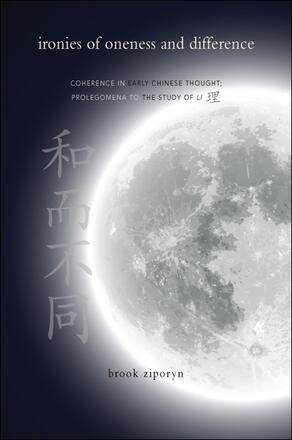
Ironies of Oneness and Difference
Coherence in Early Chinese Thought; Prolegomena to the Study of Li
Alternative formats available from:
Explores the development of Chinese thought, highlighting its concern with questions of coherence.
Description
Providing a bracing expansion of horizons, this book displays the unsuspected range of human thinking on the most basic categories of experience. The way in which early Chinese thinkers approached concepts such as one and many, sameness and difference, self and other, and internal and external stand in stark contrast to the way parallel concepts entrenched in much of modern thinking developed in Greek and European thought. Brook Ziporyn traces the distinctive and surprising philosophical journeys found in the works of the formative Confucian and Daoist thinkers back to a prevailing set of assumptions that tends to see questions of identity, value, and knowledge—the subject matter of ontology, ethics, and epistemology in other traditions—as all ultimately relating to questions about coherence in one form or another. Mere awareness of how many different ways human beings can think and have thought about these categories is itself a game changer for our own attitudes toward what is thinkable for us. The actual inhabitation and mastery of these alternative modes of thinking is an even greater adventure in intellectual and experiential expansion.
Brook Ziporyn is Professor of Chinese Philosophy, Religion, and Comparative Thought at the University of Chicago Divinity School and Visiting Professor of Philosophy at the National University of Singapore. His books include The Penumbra Unbound: The Neo-Taoist Philosophy of Guo Xiang, also published by SUNY Press.
Reviews
"Ziporyn takes on the deepest issues and most difficult texts from a millennium and a half of Chinese thinking, and offers exciting new ways to make sense of both individual texts and the tradition's broader concerns … Whether read separately or together, these two volumes are among the most provocative and tightly argued works on Chinese philosophy to appear in many years, and richly repay the effort it takes to learn to see through the lens of coherence." — Dao
"…Ziporyn's two volumes on 'oneness and difference' represent a well-argued and highly sophisticated attempt at understanding Chinese metaphysics on its own terms … I recommend these two volumes unconditionally to the reader." — Kai Marchal, Philosophy East & West
"…constitute[s] the first comprehensive attempt in any Western language to explore the meaning and history of the difficult term li prior to the Song period … Ziporyn displays a tremendous knowledge of difficult philosophical texts such as the commentaries to Daoist classics by Wang Bi and Guo Xiang as well as primary texts and commentaries of the Buddhist Tiantai and Huayan traditions." — Monumenta Serica